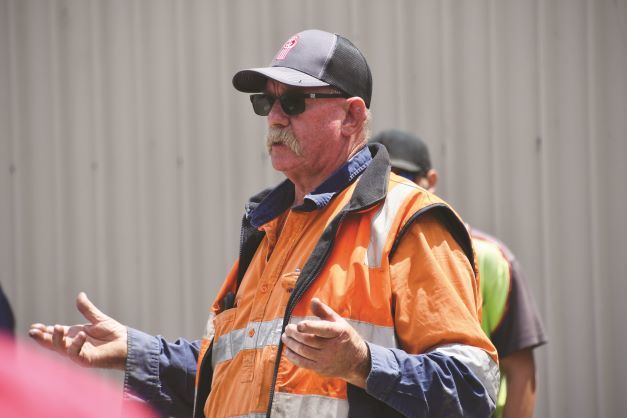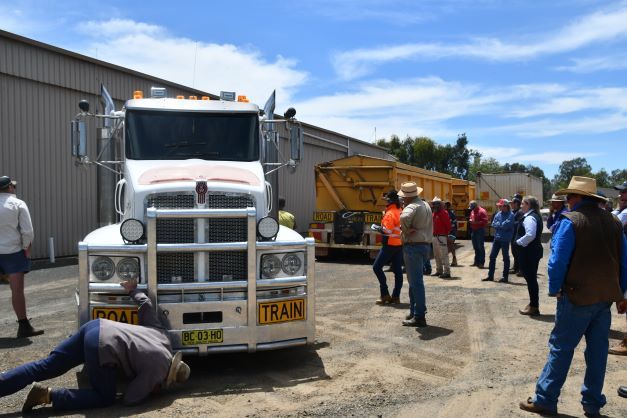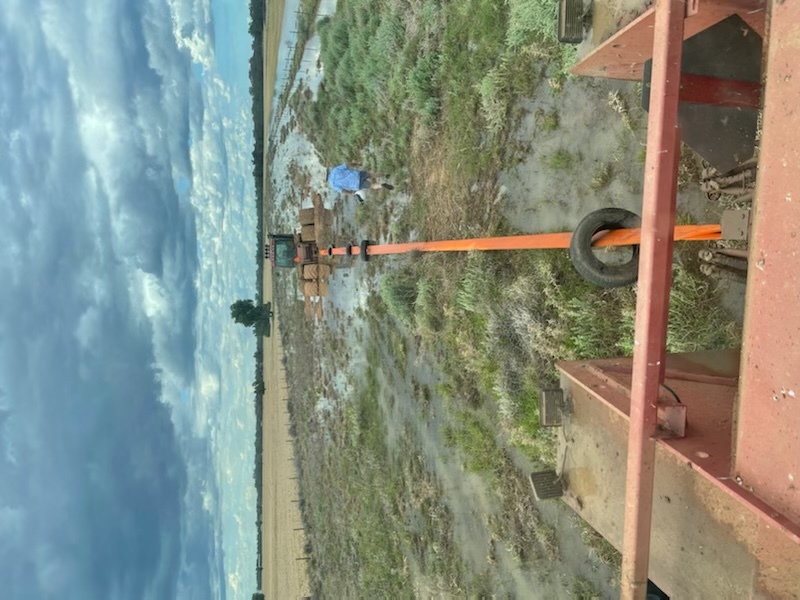A necessary 'bog-ucation'
Liam Mulhall
04 December 2022, 8:10 PM
 Boggings have become a common challenge throughout 2022. IMAGE: A McLaughlin
Boggings have become a common challenge throughout 2022. IMAGE: A McLaughlinTHE floods this year have dealt farmers a harvest filled with treacherous conditions - and with it, an increased risk of bogging heavy machinery.
WorkSafe NSW say it is vital that farmers engage in safe recovery practices when a header or tractor inevitably gets stuck in the mud.
However, the knowledge of safe bogging procedures is not as widespread as you may think and there have been three fatalities from bog-related incidents this year alone, along with the many injuries and near misses that haven't been reported.
To help spread awareness, Simon Peters of DeltaAg Coonamble organised a 'How to Safely Remove a Bogged Vehicle' workshop on Tuesday November 22 at Conex Services' yard in Railway Street, Coonamble.
"The lack of knowledge is the reason we held the day, there's have been a few fatalities from bogged vehicles - a few ropes and straps coming loose," said Simon
"It was made up for the farmers as we come into harvest, teaching them the best ways to unbog headers, tractors and trucks."
Seminars on hitch points and weight distribution were also made by David Swain from Outback Recovery Services, and Luke Cross Engineering and Rigging.
Assistant State Inspector for Regional WHS at WorkSafeNSW, Rhys Dive, said this was one of the best turnouts he's had at an event he's been too.
"It was an incredible day - we've (WorkSafeNSW) had a series of talks around NSW and Coonamble was great."
"About sixty people showed up, which was just so impressive; harvest has started and it was a clear dry day yet they made the effort to come down."
"Everyone was really keen to learn and collaborate with each other, sharing stories of what worked and why as well as what not to do."

David Swain from Outback Recovery explaining hitch points at a workshop in Coonamble. PHOTO Coonamble Times
Rhys has been travelling around NSW attending similar events after he saw firsthand the damage poor practice can do.
"I went out to a fatality out on a property near Young and that’s when we realised we needed to look into bogging procedure."
"From that, some local famers got in contact and we organised a day to come in and talk about bog procedure."
"That first day was incredibly successful and we've just gone from there."
Presentations were also made by the Rural Adversity Mental Health Program, WorkSafeNSW, and representatives from the NSW Ambulance Service.

A workshop participant checks for hitch points in Coonamble recently. IMAGE: Coonamble Times.
Top un-bogging tips
Charles Laverty from the NSW Farmers Farm Safety Advisory Program says to take a step back and take a deep breath before planning to act; no two bogging situations are exactly the same
“Check the condition of the recovery equipment each and every time you use it – metal fatigue may affect anchor points, chains stretch, and cables and straps can fray,” Mr Laverty said.
“Always keep bystanders at least two-and-a-half times the length of the recovery straps, cables, or chains away from, and to the side, of the recovery. Never stand next to it."
“When using cables, consider the use of pulleys for mechanical advantage, and when joining straps, avoid the use of steel shackles – they become projectiles if something breaks.”
There have been twenty-nine fatalities in the Australian agriculture industry this year alone - meaning that farming is accounting for around one in every five worker deaths.

Being careful with straps is paramount when attempting to un-bog heavy machinery. IMAGE: A McLaughlin
Rhys Dive has been encouraging farmers to lay out a procedure for when a piece of machinery gets bogged - and the results have been comprehensive.
"I had a bloke call me a few days after a workshop in Nevertire telling me about his bogging procedure; his team had got a header bogged and they all just took a step back, followed their protocols, and they got the header out safely which was just fantastic to hear."
Regardless of how frustrating or how expensive it may be not getting out to a crop, Justin Everett, the Chair of NSW Farmers Grains Committee says it will never be more expensive than losing a life.
“We know people will feel under the pump to try and recoup some of the costs of sowing this crop, and that can lead to working in conditions where you’re likely to get stuck,” Mr Everitt said.
“This just adds to the pressure, and I know from experience it can be frustrating, but it’s really very important to be extra careful, because we’ve seen the disastrous consequences that can result from recovery gone wrong.
“Farms are an essential workplace but also a potentially dangerous one, so we all need to take care and work safely, because nothing can replace a life.”




